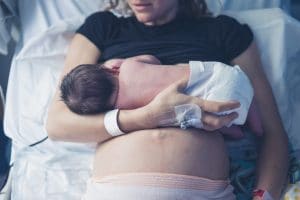The Alarming Maternal Health and Infant Mortality Crisis in New Jersey
 Most women in the United States give birth without complication and live to tell about it, but not everyone does. About 50,000 women are severely injured, and about 700 die in childbirth, each year. An investigative report in USA Today reports that about half of those deaths and injuries could have been prevented or reduced with better care. As the title says, “Hospitals know how to protect mothers. They just aren’t doing it.”
Most women in the United States give birth without complication and live to tell about it, but not everyone does. About 50,000 women are severely injured, and about 700 die in childbirth, each year. An investigative report in USA Today reports that about half of those deaths and injuries could have been prevented or reduced with better care. As the title says, “Hospitals know how to protect mothers. They just aren’t doing it.”
While globally, the maternal mortality rate has been dropping by 44% since 1990, about 830 women die each day somewhere in the world from pregnancy or childbirth-related complications. According to the numbers in the USA Today study, on average, two of those women are Americans. We live in one of the wealthiest countries with one of the most sophisticated healthcare systems in the world, yet women die needlessly from childbirth complications every year.
Maternal health in New Jersey
The state of New Jersey did not fare well regarding maternal health. In New Jersey, there were 102,647 births in 2016. The death rate was 36.2 per 100,000 births. Our rank out of 47* states? Fifth.
The harm rate in 2015 (between January and December) was 162.5 per 10,000 deliveries. Our rank out of 47 states? Tenth.
Racial disparities in maternal and infant mortality rates in New Jersey
An article in North Jersey.com reports that each year, nearly 500 babies die in NJ before their first birthday; however, children of African American women are three times as likely to die in their first year of life than those born to white women, regardless of their mothers’ income level or educational attainment. That racial disparity is larger in New Jersey than anywhere else in the United States. On the New Jersey Department of Health website, you can find a chart which displays a data table for deaths per 100,000 live births. The infant mortality rate for babies born to white women is 2.2 deaths per 100,000 live births. If the mother is Black, the rate skyrockets to 10 deaths per 100,000 live births – in the same state and in the same hospitals.
While the overall infant mortality rate in New Jersey has been declining since 2000, the racial disparity remains. The North Jersey.com story estimates that if the racial gap were closed, five more kindergarten classes could be filled in New Jersey each year, and 95 more children would live to celebrate their first birthdays.
Advocating for maternal health
New Jersey was at the forefront of maternal care for years. Per USA Today:
“New Jersey began reviewing mothers’ deaths in 1932, one of the first states to do so. Recent reports focus heavily on medical issues. A report examining deaths from 1999-2001 pointed to a failure to accurately diagnose or start treatment in nearly 12% of maternal deaths. The [maternal death review] panel mentions specific failures, such as emergency departments wrongly sending home women complaining of abdominal pain. A report covering 2006-2008 cases recommends creating ‘rapid response teams’ in hospitals that can recognize early signs of critical problems with pregnant women.”
Still, much more work was, and is, needed.
In 2018, New Jersey became the first state in the U.S. to recognize “Maternal Health Day.” Maternal health advocates got together to draw attention to the rising maternal mortality rate in the United States and in New Jersey, where the state ranks 47th out of 50 states, according to America’s Health Rankings.
That same year, Tammy Murphy, the wife of Gov. Phil Murphy announced $4.3 million in grants to address the racial gap in infant mortality rates. Mrs. Murphy said that it is “shameful that race persists as a factor in maternal health and infant mortality rates in New Jersey.” This funding will got to improve prenatal health programs in community health centers, home visits for at-risk mothers, and doulas, which are labor and deliver coaches.
Additionally, the New Jersey Department of Health and the NJ Hospital Association have received a five-year, $1 million grant from the Centers for Disease Control and Prevention to help improve the health of mothers and babies in the state.
(*The study does not include data from New Hampshire, Vermont or Hawaii.)
If you or someone you care about has sustained an injury because of medical negligence, the experienced New Jersey medical malpractice lawyers at Eichen Crutchlow Zaslow, LLP are here to fight for your right to compensation for your losses. You can schedule a free consultation with a New Jersey medical malpractice lawyer by calling 732-777-0100, or filling out our contact form. Eichen Crutchlow Zaslow has offices in Edison, Toms River and Red Bank, and fights on behalf of clients throughout the Garden State.

Eichen Crutchlow Zaslow, LLP has purposely remained small in size, because it is important to us that we get to know our clients and their needs. Larger NJ injury firms may churn out case after case, but that’s not how we operate. Partners Barry Eichen, William Crutchlow, and Daryl Zaslow have created a firm with the resources to handle complex litigation, and a team that takes your case personally.
Find out more about Eichen Crutchlow Zaslow, LLP
